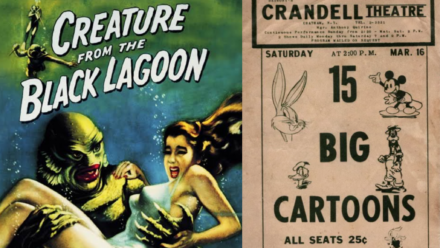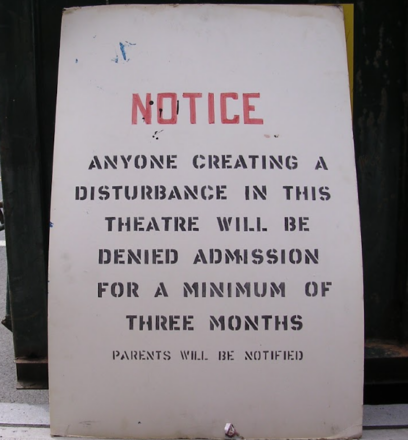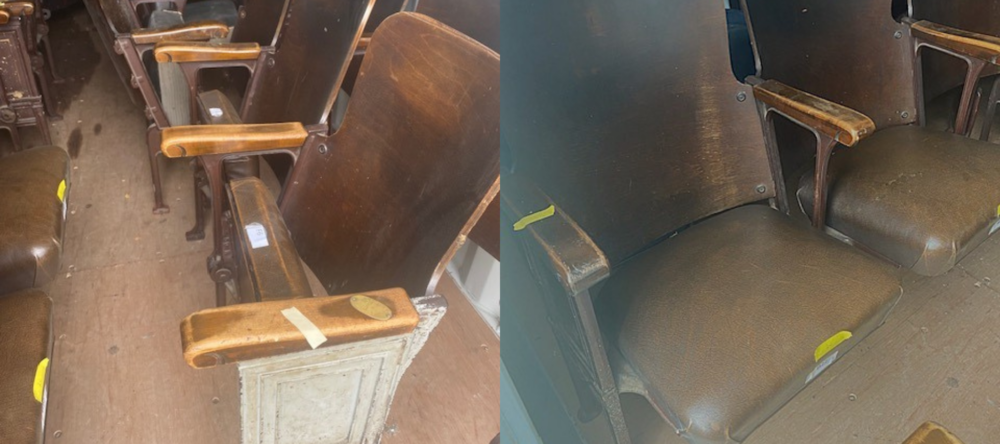Later this summer, thirty-six of the original wood and cast iron balcony seats will return to the theater as a living museum of the past. But “rather than a complete strip and refinish,” says Crandell restorer Vance Pitkin, “we’ll be preserving the original antique look and feel.”
The seat construction, he says, strongly suggests the seats are original to the Crandell. “The backs are laminated wood, the arms are solid maple, the frames are cast iron and the seats are padded leatherette, all materials that are consistent with the age of the theater,” he adds. “The frames will be repainted the same color, reddish brown with gold highlights, instead of being matched to the new seats.”
Although the rest of the new theater seats will feature modern conveniences like lumbar support and cup holders, these originals “are surprisingly comfortable,” Pitkin says. “I can imagine people wanting to sit in this piece of Crandell Theatre history.”
Crandell member and FilmColumbia volunteer Winnie Legere, who grew up in Chatham and returned in retirement, has magical memories of time spent at the Crandell as a child—especially up in the balcony. “I’ve been going to the Crandell my entire life. My first memory is sitting up there at age 5 with my father to see Creature from the Black Lagoon,” she says.

When she was growing up, Legere continued to “go all the time” with her friends. “In this area, we were so free. We would put a quarter in our pocket, and head up to the Crandell to see 15 cartoons or a movie on Saturday afternoon. Half the time they were playing the same cartoons again. We didn’t care! We watched them all over again and then walked home. There were no parents waiting outside for us, unless you were from out of town. You knew that people knew you and therefore you knew that you were safe.”
After the Quirino family bought the theater, the balcony was only open for high-ticket movies. The main reason, she says, was they didn’t want people throwing things off the balcony. “I also heard from Tony’s son Robin Quirino, whom I still see on the street from time to time, that Mrs. Quirino was too busy with her three kids. She didn’t want to have to clean the balcony.” When Mrs. Quirino was at the theater, Legere says Robin would be in a crib in the little storage room near the ladies room.

She learned at 13, however, what the downside of familiarity could be. “I was on what we called the blacklist at one point,” Legere says. “My father was an attorney in Chatham (at 14 Park Row, where attorney James Kleinbaum is now). I was there one night for a big movie, sitting with a bunch of older kids. I had just learned to blow on candy boxes to make them squeak and to put my finger in my mouth and pull it out so it made a popping sound. I was quite busy that night!”
The next day, her name appeared on the blacklist. “My father was walking to the bank a few days later and he ran into Tony. ‘Why Winnie?’ he asked him. ‘Well, she was the only one I knew.’ I was not the kind of kid who got in trouble, so I wore that distinction as a badge of honor. Look at that: I can be bad. But it banned me for an entire summer. I thought, ‘OK fine, so I had to miss the Sound of Music.’ It wasn’t the worst thing in the world.”


